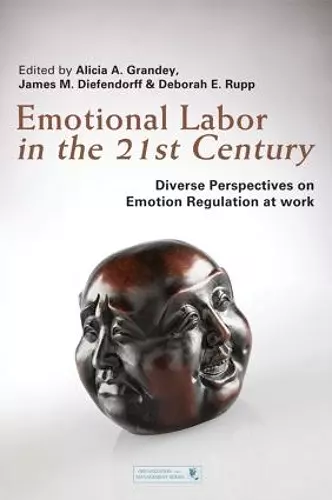Emotional Labor in the 21st Century
Diverse Perspectives on Emotion Regulation at Work
Deborah E Rupp editor Alicia Grandey editor James Diefendorff editor
Format:Hardback
Publisher:Taylor & Francis Ltd
Published:8th Aug '12
Currently unavailable, and unfortunately no date known when it will be back
This hardback is available in another edition too:
- Paperback£44.99was £49.99(9781138115910)

This book reviews, integrates, and synthesizes research on emotional labor and emotion regulation conducted over the past 30 years. The concept of emotional labor was first proposed by Dr. Arlie Russell Hochschild (1983), who defined it as "the management of feeling to create a publicly observable facial and bodily display" (p. 7) for a wage. A basic assumption of emotional labor theory is that many jobs (e.g., customer service, healthcare, team-based work, management) have interpersonal, and thus emotional, requirements and that well-being and effectiveness in these jobs is determined, in part, by a person’s ability to meet these requirements. Since Hochschild’s initial work, psychologists, sociologists, and management scholars have developed distinct theoretical approaches aimed at expanding and elaborating upon Hochschild’s core ideas. Broadly speaking, emotional labor is the study of how emotion regulation of oneself and others influences social dynamics at work, which has implications for performance and well being in a wide range of occupations and organizational contexts.
This book offers researchers and practitioners a review of emotional labor theory and research that integrates the various perspectives into a coherent framework, and proposes an agenda for future research on this increasingly relevant and important topic. The book is divided into 5 main sections, with the first section introducing and defining emotional labor as well as creating a framework for the rest of the book to follow. The second section consists of chapters describing emotional labor theory at different levels of analysis, including the event, person, dyad, and group. The third section illustrates the diversity of emotional labor in distinct occupational contexts: customer service (e.g. restaurant, retail), call centers, and caring work. The fourth section considers broader contextual influences – organizational-, societal-, and cultural-level factors – that modify how and when emotional labor is done. The final section presents a series of ‘reflective essays’ from eminent scholars in the area of emotion and emotion regulation, where they reflect upon the past, present and future of emotion regulation at work.
"In this cutting-edge book the editors have done a masterful job of assembling an international team of experts to explore the critical discipline of emotional labor. This is a "must read" book for anyone interested in the latest scientific research." - Russell S. Cropanzano, Eller School of Business, University of Arizona, USA
"This volume represents a comprehensive and much needed integration of sociological, psychological, and organizational perspectives on emotional labor. By taking the perspective of employees, customer, clients, and organizations the authors highlight the costs and benefits of emotional regulation at work for individuals, organizations, and society as a whole." - Joyce E. Bono, Professor of Management, Warrington College of Business, University of Florida, USA
"This important book brings together distinguished scholars who bring insight to the important — and increasingly more important — question of how real people respond to the intrusion of economic roles into our public and private emotional spaces. This reach of this topic has expanded exponentially within academic circles, just as it has expanded exponentially for American workers who find themselves increasingly in service roles. The volume is a must for any serious reader about emotion in the workplace." - Hillary Anger Elfenbein, Professor of Organizational Behavior, Washington University in St. Louis, USA
"Grandey, Diefendorff and Rupp have marshalled the experts to create the definitive compendium on emotional labor research. The chapters cover the landscape of emotional labor research, sweeping across disciplines, methodologies, levels, and cultures. Along the way, we are invited to revisit three decades of research, reflect on current issues, and envision the future of the field. This an indispensable book for scholars of emotional labor and it also speaks to a broader audience, challenging us all to reflect on the ways in which emotional labor infiltrates our work world." - Theresa M. Glomb, Department of Work and Organizations, Carlson School of Mangement, University of Minnesota, USA
ISBN: 9781848729490
Dimensions: unknown
Weight: 800g
344 pages